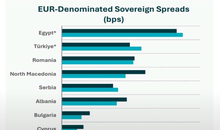
 Flash News
Flash News
Lavrov: NATO is risking self-destruction with new military budget
Kurti and Vučić "face off" tomorrow in Skopje
Construction worker dies after falling from scaffolding in Berat
The prosecution sends two Korça Municipality officials to trial
Violation with the €2.3 million tender, GJKKO imposes security measures on the head of the Public Procurement Commission, he is suspended from duty
ChatGPT reduces youth employment, here are the most affected sectors in the world

The number of jobs for young people has fallen by almost a third since ChatGPT launched in November 2022.
Vacancies for graduates, professional internships, practical jobs and entry-level positions that do not require a degree have fallen by 31.9 percent, according to a study by job search site Adzuna, according to The Times.
These entry-level jobs now make up just a quarter of the overall job market, down from 28.9 percent in 2022.
Retail, IT, accounting, and finance are among the sectors hardest hit since the artificial intelligence application began operating.
A growing number of companies have spoken openly about their plans to use artificial intelligence to reduce the number of employees.
In May 2023, BT said it would replace 10,000 jobs with artificial intelligence by the end of the decade.
Allison Kirkby, chief executive of BT, recently said that advances in AI could lead to even bigger job cuts at the telecommunications company.
Dario Amodei, CEO of Anthropic, the $61 billion AI startup behind the chatbot Claude, warned last month that AI could eliminate half of entry-level office jobs within five years, increasing unemployment by 10 to 20 percent.
James Neave, head of data science at Adzuna, said that in addition to the general economic challenges facing businesses, AI is a major factor in the shrinking entry-level job market.
“If you can reduce employment to the entry level, that will simply increase efficiency and improve cost savings,” he added.
Increasing burdens on businesses due to rising national insurance contributions and the national minimum wage, coupled with the upcoming Employment Rights Act, have also discouraged companies from hiring at lower levels.
The number of entry-level positions fell another 4.2 percent in May, even as the broader labor market continued to strengthen. The total number of jobs rose 0.49 percent in May from a year earlier, to 858,465 — the third consecutive monthly increase.
The average advertised salary also rose by 9.4 per cent year-on-year, reaching £42,403 – the strongest annual increase since mid-2022. The biggest drop in entry-level jobs is in the retail sector, with a 78.2 per cent drop in advertised roles between November 2022 and May 2025, followed by the logistics and warehousing sector and administration.
"National Insurance contributions were simply a financial burden," said Neave, adding that the Employment Rights Act "is making the situation even worse for employers."
“If you are an employer, all of this adds to the reasons why you shouldn't hire people,” he said.
The number of vacancies has more than halved in some sectors since November 2022. IT jobs have fallen by 54.8 percent, while entry-level positions in accounting and finance have fallen by 50.8 percent.
The total number of vacancies in the UK has now returned to pre-pandemic levels, exceeding the global average, but still lags behind major markets such as the United States, France and Germany.
The ratio of job seekers to each vacancy increased to 2.02, from 1.98 in April, while the average time to fill a job fell from 39.6 days to 35.8 days.
Latest news


Lavrov: NATO is risking self-destruction with new military budget
2025-06-30 20:13:54
Turkey against the "Bektashi state" in Albania: Give up this idea!
2025-06-30 20:03:24

Accused of sexual abuse, producer Diddy awaits court decision
2025-06-30 19:40:44



Kurti and Vučić "face off" tomorrow in Skopje
2025-06-30 18:44:12
Tourism: new season, old problems
2025-06-30 18:27:23


Construction worker dies after falling from scaffolding in Berat
2025-06-30 17:51:44




Almost free housing: East Germany against depopulation
2025-06-30 16:43:06

Hamas says nearly 60 people killed in Gaza as Trump calls for ceasefire
2025-06-30 16:14:15
Drownings on beaches/ Expert Softa: Negligence and incompetence by institutions!
2025-06-30 16:00:03


European ports are overloaded due to Trump tariffs
2025-06-30 15:30:44
The prosecution sends two Korça Municipality officials to trial
2025-06-30 15:19:54

Lezha/ Police impose 3165 administrative measures, handcuff 19 drivers
2025-06-30 14:55:04
Young people leave Albania in search of a more sustainable future
2025-06-30 14:47:52
Record-breaking summer, health threats and preventive measures
2025-06-30 14:36:19


Constitution of the Parliament, Osmani invites political leaders to a meeting
2025-06-30 14:07:54

Heat wave 'invades' Europe, Spain records temperatures up to 46 degrees Celsius
2025-06-30 13:42:02
Accident in Vlora, car hits 2 tourists
2025-06-30 13:32:16

Kurti confirms participation in today's official dinner in Skopje
2025-06-30 13:03:27

Fight between 4 minors in Kosovo, one of them injured with a knife
2025-06-30 12:38:45

Report: Teenage girls the loneliest in the world
2025-06-30 12:20:40
Commissioner Kos and Balkan leaders meet in Skopje on Growth Plan
2025-06-30 12:07:59
Wanted by Italy, member of a criminal organization captured in Fier
2025-06-30 11:55:53
Hundreds of families displaced by wave of Israeli airstrikes in Gaza
2025-06-30 11:45:17

Zenel Beshi: The criminal who even 50 convictions won't move from Britain
2025-06-30 11:23:19
A new variant of Covid will circulate during the summer, here are the symptoms
2025-06-30 11:14:58


"Partizani" case, trial postponed to July 21 at the Special Court
2025-06-30 10:41:05
Uncontrolled desire to steal, what is kleptomania, why is it caused
2025-06-30 10:30:08
Requested change of security measure, hearing for Malltez postponed to July 7
2025-06-30 10:24:32


Output per working hour in Albania 35% lower than the regional average
2025-06-30 09:54:35


The trial for the "Partizani" file begins today
2025-06-30 09:27:57
22 fires in the last 24 hours in the country, 2 still active
2025-06-30 09:21:28
How is the media controlled? The 'Rama' case and government propaganda
2025-06-30 09:13:36
German top diplomat: Putin wants Ukraine to capitulate
2025-06-30 09:00:07
Foreign exchange, how much foreign currencies are sold and bought today
2025-06-30 08:44:38
Chart/ Sovereign risk for Albania from international markets drops significantly
2025-06-30 08:26:38
Horoscope, what do the stars have in store for you?
2025-06-30 08:11:44
Clear weather and passing clouds, here is the forecast for this Monday
2025-06-30 07:59:32
Morning Post/ In 2 lines: What mattered yesterday in Albania
2025-06-30 07:47:37
Milan make official two departures in attack
2025-06-29 21:57:23
6 record tone
2025-06-29 21:30:46
4-year-old girl falls from balcony in Lezha, urgently taken to Trauma
2025-06-29 21:09:58


Assets worth 12 million euros seized from cocaine trafficking organization
2025-06-29 19:39:43
Fire in Durrës, Blushi: The state exists only on paper
2025-06-29 19:17:48

Fire endangers homes in Vlora, helicopter intervention begins
2025-06-29 18:27:51
France implements smoking ban on beaches and parks
2025-06-29 18:02:08
England U-21 beat Germany to become European champions
2025-06-29 17:42:49
Trump criticizes Israeli prosecutors over Netanyahu's corruption trial
2025-06-29 17:08:10
Street market in Durrës engulfed in flames
2025-06-29 16:52:57

UN nuclear chief: Iran could resume uranium enrichment within months
2025-06-29 16:03:24
Albanian man dies after falling from cliff while climbing mountain in Italy
2025-06-29 15:52:01

Another accident with a single-track vehicle in Tirana, a car hits a 17-year-old
2025-06-29 15:07:15
While bathing in the sea, a vacationer in Durrës dies
2025-06-29 14:54:01
Sentenced to life imprisonment, cell phone found in Laert Haxhiu's cell
2025-06-29 14:26:40
77 people detained in protest, Vučić warns of new arrests
2025-06-29 14:07:46

From a hospital for children to a prison for politicians
2025-06-29 13:34:02
77-year-old man found dead in Pogradec
2025-06-29 13:13:10
The Metropolitan of Gjirokastra passes away
2025-06-29 12:52:27
The 39th session to elect the speaker of Kosovo's parliament also fails
2025-06-29 12:31:28
France bans smoking on beaches and parks
2025-06-29 12:16:23
Alarm from the Philippines: Albania, a growing destination for labor trafficking
2025-06-29 11:50:34

After 2-year ban, Paul Pogba signs with Monaco
2025-06-29 11:15:15
Can Albania produce all the food it needs?
2025-06-29 11:02:12


